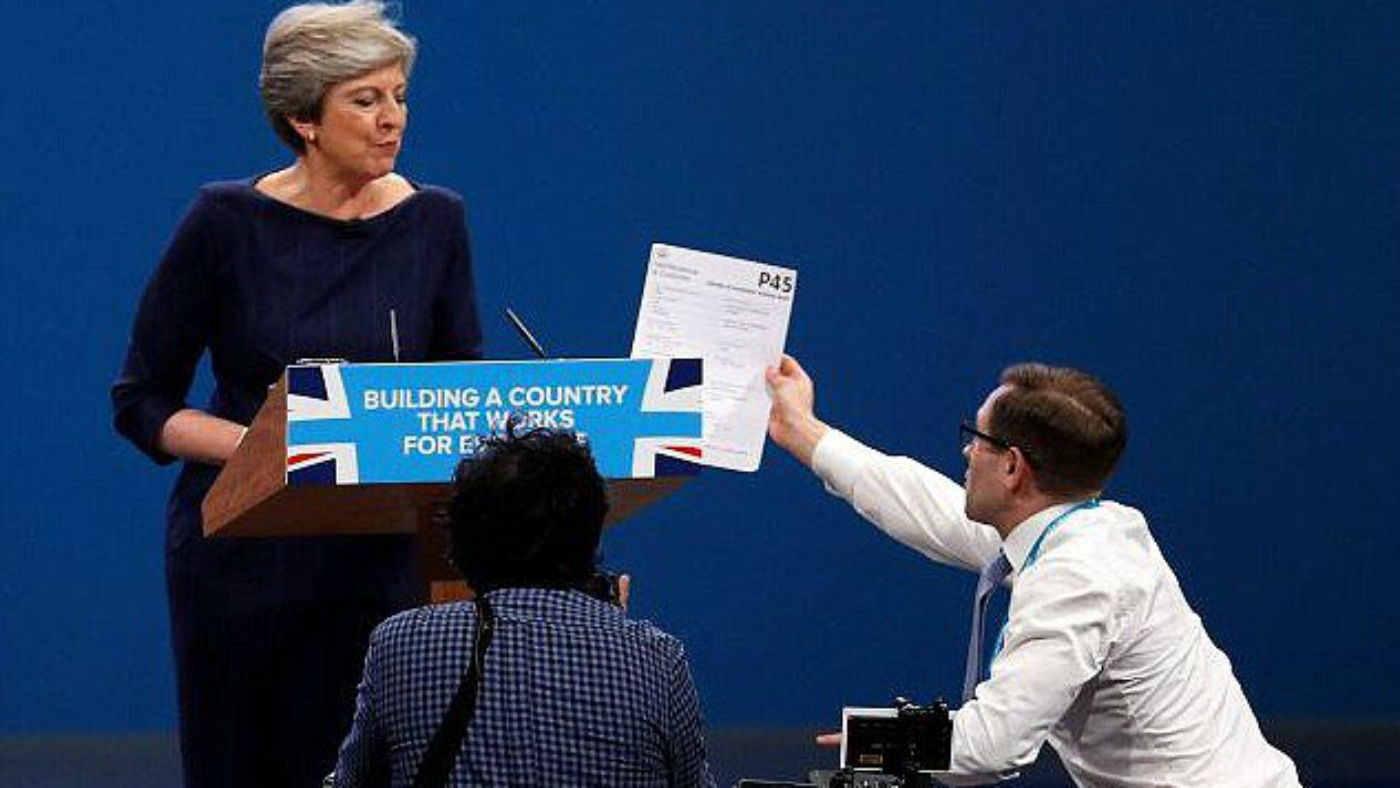Theresa May struggles through ‘nightmare’ Tory conference speech
PM battles sore throat and a P45-wielding prankster to deliver keynote address

A free daily email with the biggest news stories of the day – and the best features from TheWeek.com
You are now subscribed
Your newsletter sign-up was successful
As Conservative Party conference speeches go, Theresa May’s was a “British nightmare”, in the words of The Spectator’s Isobel Hardman.
“Excruciating to watch,” tweeted The Sunday Times political editor Tim Shipman, while The Sun’s Harry Cole agreed, “Not the images No. 10 were hoping for.” The Daily Mirror summed up the Prime Minister’s keynote speech in Manchester today as an “unmitigated, multifaceted disaster of epic proportions”.
May apologised to Conservative Party members for not securing the victory they had hoped for in June’s general election, and promised two new policy initiatives on housing and energy. But her address is more likely to be remembered for an interruption by comedian Simon Brodkin, who handed May a fake P45 form supposedly on behalf of Boris Johnson.
The Week
Escape your echo chamber. Get the facts behind the news, plus analysis from multiple perspectives.

Sign up for The Week's Free Newsletters
From our morning news briefing to a weekly Good News Newsletter, get the best of The Week delivered directly to your inbox.
From our morning news briefing to a weekly Good News Newsletter, get the best of The Week delivered directly to your inbox.
Brodkin, who performs under the name Lee Nelson, wasn’t the only distraction. An under-the-weather May repeatedly coughed and spluttered, at one point accepting a throat lozenge from Chancellor Philip Hammond. By the time she was finished, even the slogan on the wall behind her was falling apart, in what the Mirror described as a “desperate bid to escape the excruciating car-crash event”.
The strident message, “Building a country that works for everyone“, gave up the ghost, with the letters F and E falling to the floor, leaving the Tory message as: “Building a country that works or everyon”.
As for May's two big policy announcements, the PM unveiled a £2bn investment in the building of affordable housing and a cap on energy price rises.
The housing announcement was trailed overnight in The Sun as the biggest investment in council housing by a Tory leader since Harold Macmillan in the 1950s, but, as the Financial Times’s Jim Pickard reports, that claim seems wide of the mark.
A free daily email with the biggest news stories of the day – and the best features from TheWeek.com
“It was an ordeal rather than a triumphant return today,” the BBC’s Laura Kuenssberg says of May’s closing conference address, which was meant to mark a big return for the Tory leader.
Kuenssberg believes the fear at No. 10 will be that it was “completely overshadowed because no one will remember anything from the speech other than she had to struggle through it”.
A little too personal?
The PM’s aim was “to remind a Brexit-obsessed conference that May is returning to her key ‘burning injustices’ themes on the steps of No. 10 way back in July 2016”, says HuffPost UK’s Paul Waugh.
It was said to be a much more personal speech than she usually gives, he adds, but “the danger is that if her aides really do ‘Let Theresa be Theresa’, the public may just shrug and say, ‘Is that it?’”
Although May’s housing policy may prove to be transformative, “we have had little detail on the energy price cap plan so far, and so the speech does not really fill the policy gap in the Conservative Party’s domestic policy agenda,” says The Guardian’s Andrew Sparrow. “But it is a move in the right direction.” Unfortunately, he adds, while most party conferences speeches are quickly forgotten, ”this one will be remembered for the rest of May’s career”.
May’s P45 moment
The frailties shown by the PM could strengthen the push for a leadership challenge from within her party.
“Conventional political wisdom said Theresa May would win by a landslide on 8 June. Having failed to do so, conventional political wisdom also said she should have resigned on 9 June,” says The Times’s Matt Chorley.
“That she didn’t, and has got up each day since and decided not to resign today either, is testament to both her own much-tested resilience and the inadequacies of the other possibilities.”
May addressed her challengers head-on today, says Chorley. She said all party members, including her Tory leadership rivals, should be concentrating on voters’ futures, “not worrying about our job security, but theirs; not addressing our concerns, but the issues, the problems, the challenges, that concern them”.
Although “it’s a lovely line, it’s not true,” says the New Statesman’s Stephen Bush. If she wasn’t worried about her own job security, “she wouldn't stand by as Boris Johnson offends another European ally or causes a row abroad”.
“Only someone with a heart of stone can have failed to feel at least a flicker of sympathy for the Prime Minister,” he adds, but this speech shows May’s great tragedy is that she has “thrown away the opportunity to demonstrate real reflection about what happened on 8 June - she’s declined the Conservatives’ chance to change”.
-
 The ‘ravenous’ demand for Cornish minerals
The ‘ravenous’ demand for Cornish mineralsUnder the Radar Growing need for critical minerals to power tech has intensified ‘appetite’ for lithium, which could be a ‘huge boon’ for local economy
-
 Why are election experts taking Trump’s midterm threats seriously?
Why are election experts taking Trump’s midterm threats seriously?IN THE SPOTLIGHT As the president muses about polling place deployments and a centralized electoral system aimed at one-party control, lawmakers are taking this administration at its word
-
 ‘Restaurateurs have become millionaires’
‘Restaurateurs have become millionaires’Instant Opinion Opinion, comment and editorials of the day
-
 How corrupt is the UK?
How corrupt is the UK?The Explainer Decline in standards ‘risks becoming a defining feature of our political culture’ as Britain falls to lowest ever score on global index
-
 The high street: Britain’s next political battleground?
The high street: Britain’s next political battleground?In the Spotlight Mass closure of shops and influx of organised crime are fuelling voter anger, and offer an opening for Reform UK
-
 The MAGA civil war takes center stage at the Turning Point USA conference
The MAGA civil war takes center stage at the Turning Point USA conferenceIN THE SPOTLIGHT ‘Americafest 2025’ was a who’s who of right-wing heavyweights eager to settle scores and lay claim to the future of MAGA
-
 Is a Reform-Tory pact becoming more likely?
Is a Reform-Tory pact becoming more likely?Today’s Big Question Nigel Farage’s party is ahead in the polls but still falls well short of a Commons majority, while Conservatives are still losing MPs to Reform
-
 What does the fall in net migration mean for the UK?
What does the fall in net migration mean for the UK?Today’s Big Question With Labour and the Tories trying to ‘claim credit’ for lower figures, the ‘underlying picture is far less clear-cut’
-
 Five takeaways from Plaid Cymru’s historic Caerphilly by-election win
Five takeaways from Plaid Cymru’s historic Caerphilly by-election winThe Explainer The ‘big beasts’ were ‘humbled’ but there was disappointment for second-placed Reform too
-
 The new age of book banning
The new age of book banningThe Explainer How America’s culture wars collided with parents and legislators who want to keep their kids away from ‘dangerous’ ideas
-
 Taking the low road: why the SNP is still standing strong
Taking the low road: why the SNP is still standing strongTalking Point Party is on track for a fifth consecutive victory in May’s Holyrood election, despite controversies and plummeting support